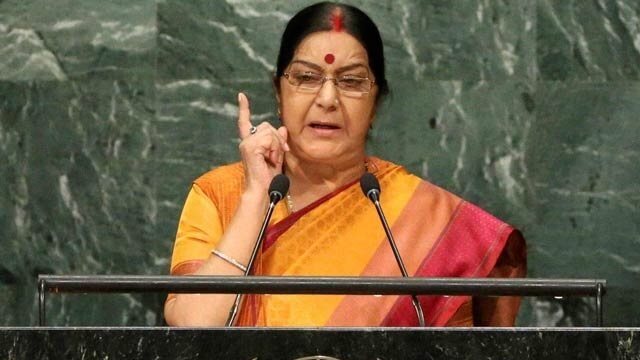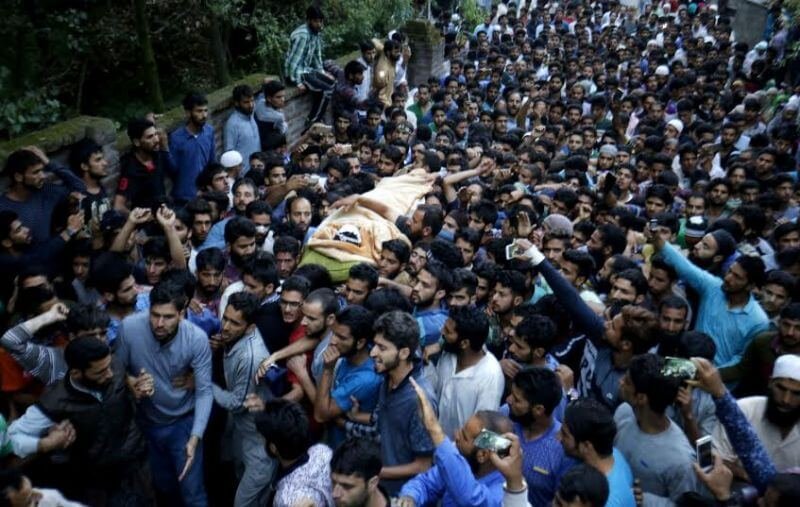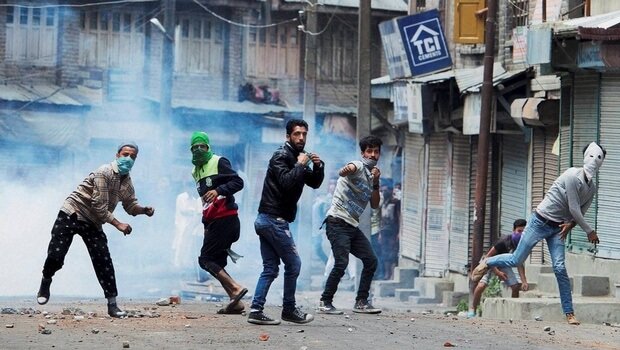In the war of words between India and Pakistan at the 71st United Nations General Assembly, Kashmir has been the fiery topic due to the ongoing ten-week long civilian uprising in the state. More than 80 people have been killed, nearly 13,000 injured and many blinded by pellets, bullets and tear-gas shells fired by the government forces to quell the mass demonstrations that started after the killing of popular rebel commander Burhan Wani on July 8.
Internationally, the state of affairs between India and Pakistan has drawn attention. Especially with the recent attack on a military base in North Kashmir’s Uri in which 19 Indian soldiers were killed on September 20.
During his address at the UN on September 21, Pakistan’s Prime Minister Nawaz Sharif said that Wani had emerged as a symbol of the latest Kashmiri Intifada. He accused India of dealing with the uprising in Kashmir with brutal force and stated that Pakistan supports Kashmir’s demand for right to self-determination. Sharif also reiterated that Pakistan wants peace with India instead of confrontation and it was ready to enter into a serious dialogue with India for peaceful resolutions of all outstanding disputes especially Kashmir.
In response to this, India again expressed shock and anguish. India’s junior foreign minister MJ Akbar told reporters, “It is shocking that a leader of a free nation can glorify a self-declared terrorist (Burhan Wani). This is self-incrimination by Pakistan.” He said that Pakistan has not walked even a mile for peace so “where is the question of the extra mile?” He added that Pakistan wants dialogue while “holding a gun in its hand. Talks and guns don’t go together.” On the record, Pakistan has certainly called for dialogue but unconditional, in which Kashmir is one of issues to discuss – but India claims Kashmir is an internal issue of India. Thus, dialogue has never had any positive outcome owing to such opposing views.
While the diplomatic debate continued at the UN, the two countries were also taking measures that hinted there could be military aggression from both sides. The analysts kept debating who would win the war and in Kashmir, the bone of contention, the uprising continued.

On Monday, September 26, India’s foreign minister, Sushma Swaraj spoke for 20 minutes at the UN, accusing Pakistan of harbouring terrorism. “In our midst, there are nations that still speak the language of terrorism, that nurture it, peddle it, and export it,” she said. “To shelter terrorists has become their calling card. We must identify these nations and hold them to account. These nations, in which UN designated terrorists roam freely, lead processions and deliver their poisonous sermons of hate with impunity, are as culpable as the very terrorists they harbour. Such countries should have no place in the comity of nations.”
To counter the truth that human rights violations continue in Kashmir, raised by Sharif in his speech, Swaraj raised the issue of Balochistan. Rejecting all the allegations, Pakistan called her statement “a litany of falsehoods about Pakistan and a travesty of facts and history…[that] only reflects the deceit and hostility of her government towards Pakistan.”

It is a fact on ground that India’s response has been “to deflect global attention from the brutalities being perpetrated by India’s over half a million occupation force against innocent and unarmed Kashmiri children, women and men in the Indian occupied Jammu and Kashmir.” A Kashmiri would say Pakistan was not wrong in saying that “during the last two and a half months, over a hundred innocent Kashmiris have been killed, hundreds blinded and thousands injured by Indian bullets and pellets, including infants, children, women and men.”
From a Kashmiri perspective, nothing in this statement by Pakistan is wrong. Whatever was said is exactly what has been happening in the Valley for the last 10 weeks. There is no doubt about the use of excessive force by the government forces against the civilians. Pakistan called it “the worst form of state terrorism, a war crime” – a statement that many Kashmiris I have spoken to, would endorse.
The demand for an independent probe of human rights violations in Kashmir by the forces has been pending for years now. With Pakistan calling upon India to “accept the investigation proposed by the UN High Commissioner for Human Rights and allow them access for the purpose”, they have endorsed the demand of people in Kashmir. But it has never been taken forward.
India’s negative response to such an investigation has further escalated anger among the people and been a reason for continuous violations. It is also right to say that Jammu and Kashmir was never an integral part of India, being a disputed territory, whose final status has yet to be determined in accordance with several resolutions of the UN Security Council. Pakistan claimed so and also said “the right of the Kashmiri people to self-determination has been recognised and promised to them by the UN Security Council and by India and Pakistan.”

As per the resolutions, both countries have to let Kashmiris decide their political future. Pakistan also questioned the timing of the attack on the Indian Army base in Uri on September 18, saying it was to “divert attention from India’s atrocities in occupied Jammu and Kashmir.” Many in Kashmir also believe that the timing of attack was questionable and only affected the civilian uprising in the Valley.
There have been international calls for for talks between the two countries, and Pakistan also said, “India suspended talks more than a year ago and has refused to resume them despite repeated offers from Pakistan and advice from the international community.” It is in the interests of everyone, including Kashmiris, that there shall be a meaningful dialogue. Talks, as rightly said by Pakistan, are in the interest of both India and Pakistan and the people of our two countries.
Following up on that, Pakistan again said that it is “ready and willing for serious and result oriented talks with India, especially to resolve the longstanding core dispute of Jammu and Kashmir.” It was in Kashmir that Pakistan was once again seen as a leading supporter of people, by raising issues of human rights violations and right to self-determination at the world stage.
Disclaimer : The information, ideas or opinions appearing in this article are those of the author and do not reflect the views of ScoopWhoop. ScoopWhoop does not assume any responsibility or liability for the same.
(Feature image source: PTI)

















